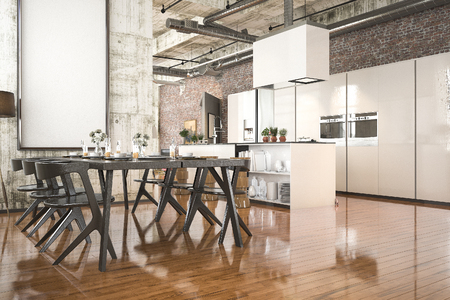1. Introduction to Smart Kitchen Technology
In recent years, smart technology has revolutionized the way we live, and the kitchen is no exception. Modern homes are embracing intelligent appliances and connected devices that make cooking, cleaning, and food storage more convenient, efficient, and sustainable. From voice-controlled ovens to AI-powered refrigerators, smart kitchen technology is transforming everyday tasks into seamless experiences.
How Smart Technology Enhances Convenience
One of the biggest advantages of smart kitchen technology is the convenience it offers. Imagine preheating your oven from your smartphone while youre on your way home or using a voice assistant to set a timer while your hands are busy preparing ingredients. These innovations save time and effort, making cooking less stressful and more enjoyable.
Boosting Efficiency in the Kitchen
Smart appliances are designed to optimize efficiency by automating tasks and providing real-time updates. Refrigerators with built-in cameras let you check their contents remotely, helping you avoid unnecessary grocery trips. Smart dishwashers adjust water usage based on load size, reducing waste without sacrificing performance. The integration of these technologies helps streamline daily kitchen routines.
Promoting Sustainability Through Smart Solutions
Many smart kitchen devices are built with sustainability in mind. Energy-efficient appliances consume less power, while AI-driven cooking systems minimize food waste by suggesting recipes based on available ingredients. Below is a comparison of traditional vs. smart kitchen appliances in terms of efficiency and sustainability:
| Feature | Traditional Appliances | Smart Appliances |
|---|---|---|
| Energy Consumption | Higher energy usage | Optimized for lower energy consumption |
| Food Waste Reduction | No tracking or monitoring | AI-driven inventory management |
| User Control & Automation | Manual operation only | Remote control via apps & voice assistants |
| Sustainability Impact | Larger environmental footprint | Ecodesign & resource optimization |
The Future of Smart Kitchens
The evolution of smart kitchen technology is just beginning. As AI, IoT, and automation continue to advance, future kitchens will become even more intuitive and efficient. Whether it’s self-cleaning surfaces or robotic cooking assistants, the possibilities are endless for creating a smarter, more sustainable home.
2. AI-Powered Appliances and Their Benefits
Smart kitchen technology has come a long way, and AI-powered appliances are at the forefront of this transformation. From smart ovens to intelligent refrigerators, these devices use artificial intelligence to enhance cooking efficiency, improve food management, and make everyday tasks easier.
Smart Ovens: Precision Cooking Made Easy
AI-integrated ovens take the guesswork out of cooking. They can recognize different types of food, automatically adjust temperature and cooking time, and even provide step-by-step cooking instructions through connected apps. Some advanced models also feature voice control compatibility, allowing users to operate them hands-free.
Key Features of Smart Ovens
| Feature | Benefit |
|---|---|
| Food Recognition | Automatically identifies ingredients and adjusts settings for optimal cooking. |
| Remote Control via Apps | Allows users to monitor and control the oven from anywhere using a smartphone. |
| Voice Command Integration | Supports Alexa or Google Assistant for hands-free operation. |
| Self-Cleaning Functions | Makes maintenance effortless with automated cleaning modes. |
Smart Refrigerators: Intelligent Food Management
A new generation of AI-powered refrigerators helps homeowners keep their kitchens organized while reducing food waste. These fridges can track expiration dates, suggest recipes based on available ingredients, and even create grocery lists synced with your smartphone.
Main Benefits of Smart Refrigerators
- Food Inventory Tracking: Keeps an updated list of stored items and alerts you when products are about to expire.
- Recipe Suggestions: Uses AI to recommend meals based on what’s inside the fridge.
- Energy Efficiency: Adjusts cooling settings automatically to reduce energy consumption.
- Built-in Cameras: Lets users check fridge contents remotely via a smartphone app.
The Future of AI in Kitchen Appliances
The integration of AI into kitchen appliances is making daily life more convenient. As technology continues to evolve, we can expect even smarter features like personalized nutrition tracking, automated meal planning, and enhanced voice interactions. Investing in AI-powered kitchen appliances not only saves time but also makes cooking more enjoyable and efficient.
![]()
3. Voice and App-Controlled Smart Gadgets
Smart kitchen technology is making cooking more convenient than ever, thanks to voice and app-controlled gadgets. These hands-free devices allow users to control appliances, set timers, adjust temperatures, and even receive recipe suggestions—all with a simple voice command or a few taps on a smartphone.
How Hands-Free Technology is Changing Home Cooking
With smart assistants like Amazon Alexa, Google Assistant, and Apple Siri, home cooks can now operate various kitchen gadgets without lifting a finger. Whether youre preheating the oven, adjusting your coffee maker, or checking the remaining time on your slow cooker, voice control makes multitasking in the kitchen effortless.
Popular Voice-Controlled Kitchen Gadgets
| Gadget | Main Features | Voice Assistant Compatibility |
|---|---|---|
| Smart Coffee Maker | Brew coffee using voice commands; schedule brewing times via an app | Amazon Alexa, Google Assistant |
| Wi-Fi-Enabled Slow Cooker | Adjust cooking settings remotely through an app; hands-free operation with voice control | Amazon Alexa |
| Smart Oven | Preheat, set timers, and monitor cooking progress using voice or app control | Google Assistant, Amazon Alexa |
| Intelligent Refrigerator | Create shopping lists, track expiration dates, and suggest recipes based on available ingredients | Bixby (Samsung), Google Assistant, Amazon Alexa |
| Smart Faucet | Tells you water temperature and dispenses specific amounts of water with voice commands | Amazon Alexa, Google Assistant |
The Convenience of App-Controlled Appliances
Apart from voice activation, many modern kitchen gadgets come with mobile apps that offer advanced features. From adjusting cooking settings to receiving notifications when food is ready, these apps provide complete control over your appliances from anywhere.
Benefits of Remote-Controlled Kitchen Devices
- Saves Time: Start preheating your oven or brewing coffee while youre still in bed.
- Makes Cooking More Efficient: Get precise cooking instructions and reminders through your phone.
- Keeps Your Kitchen Cleaner: Reduce physical contact with surfaces to maintain hygiene.
- Adds Safety Features: Receive alerts if you accidentally leave appliances on.
- Simplifies Meal Planning: Sync grocery lists and recipes directly with your smart appliances.
The Future of Hands-Free Cooking
The integration of artificial intelligence and automation into kitchen gadgets will continue to enhance convenience for home cooks. As technology advances, we can expect even smarter appliances that anticipate our needs and make meal preparation easier than ever.
4. Sustainable and Energy-Efficient Innovations
As smart kitchen technology continues to evolve, sustainability and energy efficiency have become key priorities. Modern innovations are designed to reduce energy consumption, minimize food waste, and promote eco-friendly kitchen practices. These advancements not only help homeowners save on utility bills but also contribute to a greener planet.
Reducing Energy Consumption with Smart Appliances
Energy-efficient smart kitchen appliances use advanced sensors, automation, and AI-driven optimization to reduce unnecessary power usage. Many modern refrigerators, ovens, and dishwashers now feature energy-saving modes that adjust settings based on usage patterns.
Key Energy-Saving Features
| Smart Appliance | Energy-Saving Feature |
|---|---|
| Smart Refrigerator | Adjusts cooling based on door activity and internal temperature sensors. |
| Smart Oven | Preheats efficiently and shuts off automatically when cooking is complete. |
| Smart Dishwasher | Uses AI to detect load size and soil levels, optimizing water and power usage. |
Minimizing Food Waste with Smart Storage Solutions
Food waste is a major concern in modern households. Smart kitchen technology helps reduce waste by providing real-time tracking of food inventory, expiration reminders, and recipe suggestions based on available ingredients.
How Smart Kitchens Help Reduce Food Waste
- Smart Refrigerators: Notify users of expiring food items and suggest recipes to use them before they spoil.
- AI-Powered Meal Planning: Helps plan meals based on existing ingredients, reducing the chances of unused groceries going bad.
- Smart Composting Systems: Convert organic waste into compost for home gardens, promoting sustainability.
Eco-Friendly Kitchen Practices with Smart Technology
Sustainable kitchen technology is not just about saving energy—it also promotes eco-friendly habits like water conservation, responsible disposal of waste, and the use of sustainable materials in appliances.
Sustainable Kitchen Innovations
- Water-Efficient Faucets: Smart faucets regulate water flow to prevent wastage while ensuring optimal performance.
- Recyclable and Biodegradable Materials: Many new smart appliances are designed with eco-friendly materials to reduce environmental impact.
- Solar-Powered Kitchen Gadgets: Some small appliances now use solar power or rechargeable batteries to minimize electricity consumption.
The Future of Sustainable Smart Kitchens
The integration of AI, IoT, and automation in smart kitchens continues to pave the way for more sustainable living. As technology advances, we can expect even more innovative solutions that make energy efficiency and eco-conscious practices an effortless part of everyday life.
5. The Future of Kitchen Automation and Connectivity
The modern kitchen is evolving rapidly, thanks to advancements in smart technology. From IoT-enabled appliances to AI-driven meal planning, the future of kitchen automation is set to transform home living. These innovations not only make cooking more convenient but also improve efficiency, reduce food waste, and enhance the overall kitchen experience.
IoT-Enabled Smart Kitchens
The Internet of Things (IoT) is revolutionizing how we interact with our kitchens. Connected appliances can communicate with each other, providing a seamless cooking experience. Imagine a refrigerator that suggests recipes based on its contents or an oven that preheats itself when you start meal prep.
Key Features of IoT-Enabled Kitchens
| Feature | Benefits |
|---|---|
| Smart Refrigerators | Track food inventory, suggest recipes, and send expiration alerts. |
| Connected Ovens | Remote control via apps, automatic temperature adjustments. |
| AI-Powered Coffee Makers | Brew personalized coffee based on user preferences. |
| Voice-Controlled Assistants | Hands-free control for timers, shopping lists, and cooking instructions. |
AI-Driven Meal Planning
Artificial Intelligence (AI) is making meal planning smarter and more efficient. AI-powered apps analyze dietary preferences, track nutritional needs, and even generate grocery lists. Some systems integrate with smart appliances to automate cooking schedules and ensure meals are ready on time.
The Benefits of AI in Meal Planning
- Saves Time: Automatically generates weekly meal plans and shopping lists.
- Reduces Food Waste: Uses ingredient tracking to suggest recipes with available items.
- Nutritional Optimization: Adjusts meal plans based on health goals and dietary restrictions.
- Simplifies Cooking: Syncs with smart appliances for automated cooking processes.
The Impact on Home Living
The combination of IoT and AI in the kitchen enhances convenience, efficiency, and sustainability. Households can expect less time spent on meal prep, reduced grocery expenses through better inventory management, and healthier eating habits thanks to personalized nutrition insights. As these technologies continue to advance, the modern kitchen will become more intuitive, making home cooking easier than ever before.


